Reading Like A Historian: Class Discussion
Program Transcript
Valerie Ziegler (Interview):
In my classroom, we focus on reading sources, understanding sources, and applying those skills to answer big questions. The discussion is usually the best part, and sometimes it doesn’t always happen in every lesson, but it usually can come at the point of—at the end of the unit: How can we have students debate these questions? And, you know, I either have a full class discussion, or sometimes I’ll have them debate at their table and try to come to some answer. We try to have them come to some sort of consensus.
Ziegler:
So we’re going to talk about why did people’s opinions of the Vietnam War change: were they for social reasons, for political reasons, or for economic reasons? So, before our full discussion today, we’re going to look at two very famous people as to their opposition to the war. So, John Kerry, who we know later will run for president, testifies to the U.S. Senate, right? He was a veteran, he had three Purple Hearts. We would assume that he’s going to say…?
Student:
Good things.
Ziegler:
Maybe good things, right? That’s what we’re going to assume. Look, he’s in the military, he served. Let’s look—and follow along as I mark up this document very quickly here, about John Kerry. (reading) “I would like to talk on behalf of all those veterans… In our opinion and from our experiences, there is nothing in South Vietnam which could happen that realistically threatens the United States of America.” What is he saying? Should we be worried about Communists?
Students:
No.
Ziegler:
Doesn’t sound like it. So, what kind of reason would this be?
Student:
Political.
Ziegler:
This would be a political reason. He’s saying, “They’re not a threat…”
Valerie Ziegler (Interview):
And the intent was I wanted them to pick a side. Did they think it was political, social, or economic that really drove people, at the time, to oppose the war.
Ziegler:
Right now, in your heads, I want you to think about how would you answer this question: Why did people oppose the Vietnam War? Was it mainly for social, political, or economic? And you know how ‘philosophical chairs’ works, right? You’re going to go to one side of the room. You’re going to give your evidence. And at any point, if you feel somebody—“That was a really good point, Valerie”—I’m going to move over there because I agree with her—you can do that at any point.
Valerie Ziegler (Interview):
The basis of philosophical chairs is that you’re posing a question to students, for which there usually is not a correct answer, and they get to think about it. And the structure is that the question is posed, and they have to take a side.
Ziegler:
Alright, historians, when you’re ready, you may take all of your things with you. Social, political, economic.
Valerie Ziegler (Interview):
And then once they’ve had a few minutes to think about it, they physically move. And it might be an ‘agree/disagree,’ it might be a ‘pro/con’—whatever it is, they physically move to that side of the room.
Ziegler:
Okay! No one’s going to be ‘economic’—interesting! Maybe I’ll convince you to move over there. Is there somebody who would like to start first to make their point? Remember that you can’t talk until three other people on your side have spoken. And your idea is to get people to agree with you, to move over to that side. Okay? Who’d like to begin?
Student:
So, I believe it is social because, like, before, people really supported war only because of—they think the U.S. is doing good, but then, it’s like, ever since the ‘Living Room War’ came out, where they brought actual media to the living rooms of people in U.S., I guess people feel for them, like, they could be like, “What if this was me? Would I support this, too?” And then, like… so I guess that question really affected most people, and probably, that’s—I think that’s why it’s social.
Ziegler:
Okay, some I’m going to have a ‘political’ person—so, he makes a good point—can you give us a reason why you think that political reasons would have been more influential on peoples at the time? Or why they might have thought it was more political than just this TV war?
Student:
I think it was political because the citizens of the United States just disagreed with the war because the presidents weren’t doing what they wanted them to be doing at the time. In Document B, John Kerry states…
Ziegler:
Can we all look at Document B with Greg?
Student:
…in the fourth paragraph, he says that “someone has to die so that President Nixon won’t be, and these are his words, ‘the first President to lose a war.’” They didn’t want—(laughs)—The people, the citizens, didn’t agree with how the presidents viewed the war, how they were so easy to jump into war when all of them didn’t want to get drafted into the war. They just wanted to be American citizens; they didn’t want to be a soldier for a president.
Ziegler:
Okay.
Valerie Ziegler (Interview):
I’ve seen definite improvements in their understanding of facts, because there’s something to be said about doing something hands-on. And, you know, science classrooms have labs, and you know—but in a history class, this is sort of our lab, right? We’re pulling things out, and we’re using them hands-on, and I think that’s, aside from going outside the classroom, that’s as close as we can get in a history classroom.
Ziegler:
Can anybody—I know nobody wants to take the ‘economic’ side—but could anybody find a piece of evidence on that statistics page of economic data that people would have probably felt strongly with? Or even a speech by MLK people would have responded to as “this is an economic reason” why they opposed the war? Are you guys going to ‘Econ’?
Student:
Yep.
Ziegler:
Okay. So, Truman, make your point really loudly. They’re already joining your side before you even talk.
Student:
I’ll just go over here. [laughter]
Ziegler:
Alright, so give us economic reasoning. And you’re looking at Document…?
Student:
A.
Ziegler:
A. Can everybody look at Document A with Truman?
Student:
It says that—at the bottom—it says, “skills and money like some demonic destructive suction tube.” Its saying that the money is being wasted on the war, so… yeah.
Ziegler:
Yeah. How many times do we hear that today?
Student:
A lot.
Ziegler:
A lot, right? That they’re wasting money on the war, and so… and I think a lot of people feel that way. Were you going to add something, Damon?
Student:
It says, “And I knew that America would never invest the necessary funds or energies in rehabilitation of its poor so long as adventures like Vietnam continued to draw men and skills and money like some demonic destructive suction tube.” Like, it’s kind of saying, like, we’d rather—like, our government would rather spend money on, like, guns and bullets than actually solve problems back at home.
Ziegler:
Great.
Student:
I’d like to add on what Damon would say with this one quote from Document B, where President Nixon said, in his words, “the first President to lose a war.” Right? So, with Nixon’s pride, he’s not afraid to spend every, like, cent we have to win this war.
Valerie Ziegler (Interview):
Students love philosophical chairs. They come in excited that there’s going to be a discussion and debate, they love to debate. You know, a lot of times when it comes to a full discussion, I’m simply recording their ideas, but it’s them driving it. And I think that’s really nice when you can kind of put your hands back and let the kids run it and do real historical work and real historical analysis, and hear them having really fascinating conversations that you know that carry on for outside of the classroom.
#####

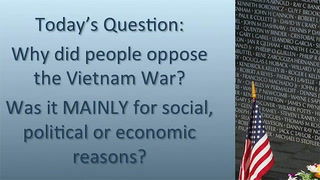
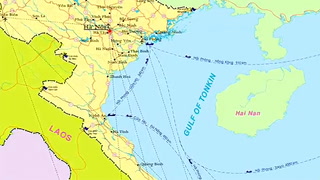
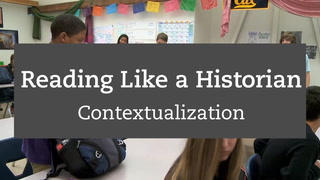
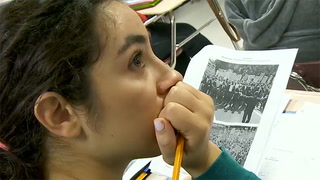
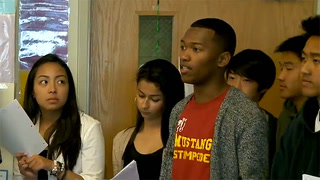
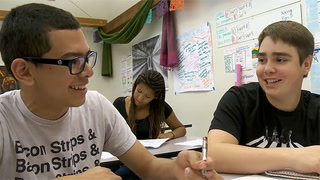
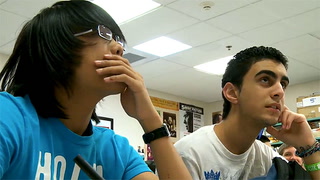
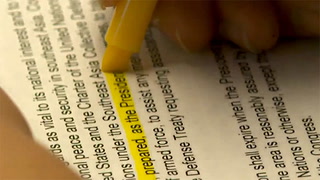
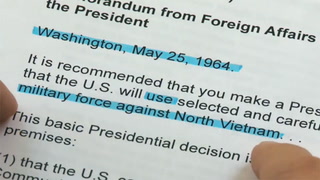
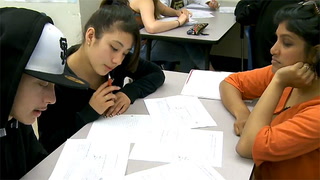
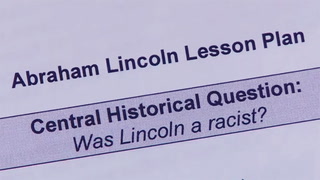








11 Comments
gwen purvis Dec 7, 2017 10:54pm
Courtney Durrant Nov 21, 2017 12:42pm
Vonetta Wideman Jan 21, 2017 8:20pm
AJ Guevara Aug 6, 2016 5:20pm
Flavio Argueta Jun 30, 2016 6:34pm